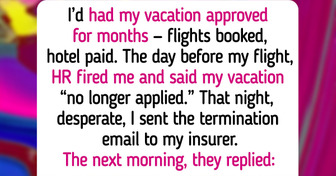Question is, are you hourly or salary? When you are salary, answering your phone after hours is frequently required. Hourly, you cannot without being "on the clock". Answering a phone call outside of regular hours is not considered working from home so if you're salaries, be careful not to overstepp with the refusal to answer the phone.
I Refuse to Answer Weekend Work Calls Because of HR’s Outdated Policy

Striking the right balance between working from home and being in the office can be tough, as each has its own set of challenges. Bella, one of our readers, enjoyed the flexibility of remote work, but when her request was denied, it didn’t sit well with her at all.
Bella reached out to us
Dear Bright Side,
I’ve been working as a graphic designer here for three months, and over the past few weeks, I’ve found myself taking calls on weekends, even though I’m pretty sure it’s not part of the deal. I was kind of OK with it, but then something changed and I’ve just decided I can’t keep doing it anymore.
It’s not just about the inconvenience; it’s about the principle of it. I’ve been expected to be available whenever needed. OK, I want to show that I’m committed and dedicated. And sometimes things are urgent. I get that.
But HR just rolled out a new policy that no one is allowed to work from home or work on a hybrid schedule. I can’t help but feel that this decision is outdated, especially given how many remote-working tools exist now, and how common it is for companies to offer this kind of flexibility. It feels like the company is ignoring the way work is evolving.
I just wanted the option to work from home when needed, but now it feels like that basic flexibility has been completely taken away. Given the circumstances, I’m no longer willing to continue taking calls outside of office hours, especially when I’m at home. If they won’t let me work from home when it suits me, I’m not going to work from home when it suits them.
Best,
Bella
Thank you, Bella, for sharing your experience. It seems like a significant move from your company, but I’m sure you weren’t the sole reason behind their decision. More and more businesses are adopting hybrid or remote work models, which ultimately benefit both employers and employees, but it doesn’t suit every company’s needs.
Advantages of remote work.
- Eliminating the daily commute: No more wasted hours on the road or public transport. This means you can begin and wrap up your workday earlier, giving you more time in your day.
- Enhanced work-life harmony: With more time spent at home, you can focus on family and personal time. Without the commute, your evenings are freed up, offering greater flexibility for hobbies, relaxation, or socializing.
- Personalized workspace: Forget competing for the prime desk or dealing with office temperature wars. At home, you’re in control—comfortable clothing is the norm (as long as you’re video-call ready). No more stuffy office attire!
Challenges of remote work.
- Increased interruptions: While home office life works for those who live alone, it can be tough with roommates, family, or pets around. Distractions are bound to happen. Create a designated workspace and kindly ask others to respect your focus time during work hours.
- Communication limitations: Modern tools like video calls, chat platforms, and emails certainly help bridge the gap, but they can’t replace the spontaneity of a coffee break or an in-person chat, where ideas flow more freely and connections are stronger.
- Feeling isolated: Working from home can quickly become repetitive and solitary, especially when you’re missing human interaction. Teamwork can feel more challenging, so it’s important to arrange occasional meetups with colleagues to break the isolation and refresh your work routine.
Working from home has its ups and downs, but the surprises along the way make it all the more interesting. If you’re curious about more stories that highlight the unpredictable side of remote work, check out this article for some eye-opening examples.
Comments
There's so many advantages to WFH. Open plan workplaces can also be an absolute nightmare for some workers, and WFH can go a long way to allowing an employee to thrive in a more controlled and peaceful environment.
Some people obviously do love and thrive on being around others but a significant amount of people find the opposite to be true.
Unfortunately the main reasons why management seem to want everyone in their offices is a control issue. Employees not being trusted to do their jobs if they aren't being physically watched which is a pretty poor management style and reflects badly on the skills of the managers.
What an entitled whinger. She'll be the first to go when managent realise AI can easily replace her "graphic design" and theyve never seen her moaning face in thr office.
Related Reads
My Family Says I’m Not a Real Mom Because of How My Baby Was Born

10 Babysitting Stories That Went From “No Problem” to “What Just Happened?”

12 Stories That Prove Kindness Still Wins in a Cruel World

My DIL Refuses to Let Me Babysit My Grandson, She Wasn’t Ready for My Payback

HR Fired Me Right Before My Vacation, So I Used It Against Them

My Sister Tried to Turn Our Family Cabin Into Her Free Resort, So I Changed the Rules

20+ Gifts That Prove It’s the Thought That Truly Counts

I Refuse to Forgive My Parents After They Took My Inheritance for Being Childless

15 Times Someone Showed Kindness Without Saying Anything

11 People Who Chose Humanity Over Hatred in the Darkest Moments

I Refused to Pay for Our Valentine’s Dinner—Then I Learned the Heartbreaking Truth

I Refuse to Let My Sister Hijack My Pregnancy Announcement



